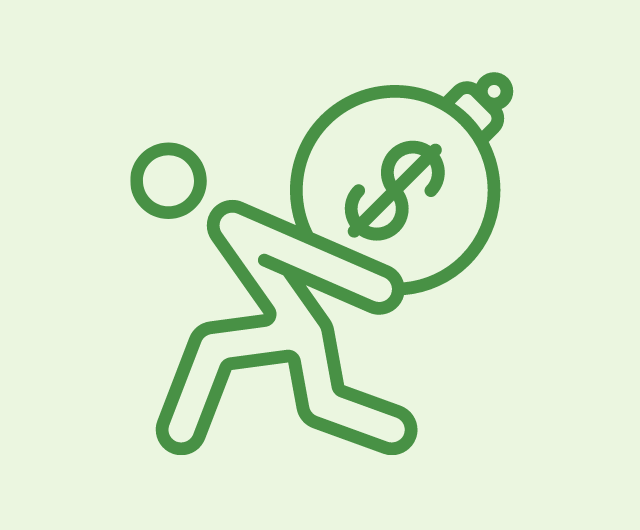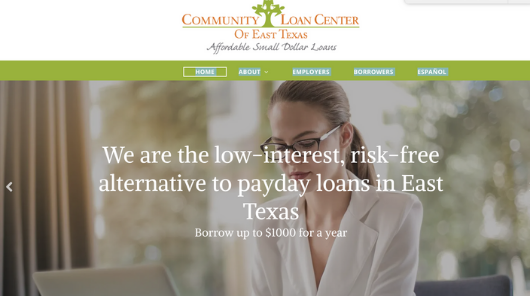Attracting new business generally means good news for any community, but one economist says the growing number of lenders — known as payday or auto-title lenders — actually hurts the Tyler economy while trapping unsuspecting consumers into a cycle of debt.
According to one study, the average annual percentage rate for such loans in Tyler range from 395% to 635% and drain millions of dollars of annual total spending in the community.

“One of the most insidious and terrible things about payday lending is you’re not talking about getting people out of poverty. You’re talking about putting people in poverty making the situation worse,” Dr. Ray Perryman said during an April 7 luncheon sponsored by the East Texas Human Needs Network.
Members of Faith for Just Lending, a coalition of faith-based institutions, are calling to end predatory lending, but Perryman expressed his doubts that legislated safeguards are forthcoming.
“We have to have those safeguards in place. We don’t have [them],” he said. “I don’t see a whole lot of momentum now in the next legislative session.”
Tackling the problem may require cooperative efforts through churches, lenders, individuals and government to educate consumers and institute some limits, according to a report by ETHHN and the Tyler Economic Wellbeing Taskforce.
Addressing a need?
Certainly, some business owners could argue there is a market for providing short-term emergency loans to consumers. With a payday loan, the consumer is given cash simply by writing a check to the loan company with the promise of repaying the amount plus a fee at the next pay day. With a title loan, the consumer provides the title to their vehicle in exchange for cash and reclaims the document once the loan is repaid.
These loans can be enticing for consumers who don’t have enough savings to pay for unexpected expenses such as car or home repairs.
Perryman said markets are common in American’s supply-and-demand economy, but such loans fail to consider a major factor.
“The markets don’t have a mechanism to take care of human needs,” he said.
The problem with these loans is that they tend to exacerbate desperate financial circumstances,” he said.

A consumer who receives a payday loan can expect to pay high fees that, left unpaid, can lead to more fees the consumer cannot afford. In the end, the consumer could pay more in fees than the original loan amount. One study found that on a $500 loan for six months the estimated annual percentage rate is 18% for traditional loans and 600% for payday and title loans.
For example: A person borrows $500 and gives the lender a check for $600 — $500 for the loan and $100 for a fee.
The lender agrees to hold the check for two weeks when repayment is due. The consumer doesn’t have enough to pay back the loan, so he pays the lender another $100 to roll over his loan for an additional two weeks. In two weeks, the consumer faces the same situation and buys another two weeks.
If the cycle continues and it takes the consumer 12 weeks to repay the original loan, they end up paying $1,100 to borrow $500 for three months.
With a title loan, a consumer risks losing their vehicle if they cannot repay the loan.
Tyler study
The number of payday or title loan businesses increased from 12 recorded in 2012 to 30 in 2019, according to Office of Consumer Credit Commission CAB licensing data. In the first quarter of 2021, task force members visited 25 of these businesses in Tyler and interviewed 112 borrowers.
Researchers found that of those borrowers interviewed:
· Payday loans dominated.
· Most borrowers are seniors or disabled.
· Most used the loans to meet basic needs.
· 64% had trouble paying the loan in full when it was due.
· 83% of borrowers took three months or more to repay the loans.
· One in five borrowers owed $1,000 or more to payday or auto title lenders.
· Borrowers were harassed when they struggled to repay the loans.
The study of the businesses showed:
· Nearly half of the locations did not provide the state-mandated loan cost disclosure.
· One in three did not provide the state-mandated warning about the loans.
· Only one of the 25 businesses surveyed posted the requirement to comply with the Military Lending Act which limits the annual percentage rate to 36% on loans to members of the military.
Individual and community impact
While payday and title loans tend to mire a consumer into a cycle of debt, they don’t help the borrower establish a healthy financial history. Consumers who rely upon payday or title loans tend to have difficulty obtaining low interest loans from traditional lenders and it impairs their ability to find a job or housing based on credit scores.
Paying off these loans also drains financial resources from a community.

“If those people had that money to spend it as they would normally spend … on food and shelter, healthcare, on shopping goods … it would generate positive economic benefits in this area,” Perryman said.
Lenders actually are loan brokers for a third party, so most of the money generated from fees benefit a larger company elsewhere, he explained.
That translates into decreases of $24.2 million in total annual spending in the Tyler area, $12 million in annual gross product, $7.3 million in annual personal income and 151 jobs, according to calculations by The Perryman Group.
Having an economic rationale shouldn’t be the main, or only, reason for helping consumers out of poverty, Perryman said.
“We should want to do that because it is the right thing to do,” he said. “It cuts through the entire economy in fundamental ways, and that’s the message we’re trying to get out to folks who are not suffering from poverty.”
Road to change

The report by the Tyler Economic Wellness Taskforce recommends six possible strategies:
· Using or starting employer-based affordable loan programs.
The Community Loan Center of East Texas located in Kilgore is a non-profit driven, employer-based loan program using a council of governments to support or provide alternatives to payday lending. Center officials report that 66% of their borrowers reported reducing their debt and 41% reported increasing their personal savings. Also 44% of their borrowers reported an improved credit score, according to the report.
· Providing financial or operational support for other low-cost lending programs.
· Using a council of governments to support or provide alternatives to payday lending.
· Evaluate municipal fines, fees and collection policies that may drive people to high-cost loans.
· Improve systems to connect to community asset building and financial empowerment resources.
· Protect citizens through a unified ordinance. Adopt regulations to protect citizens by monitoring credit access businesses to reduce abusive or predatory lending practices. These regulations may require a registration program, impose restrictions on loan extensions and impose record keeping requirements.
“Some states have some things, some states have done others,” Perryman said. “We have not had a great record in Texas.”
Educational programs by churches, nonprofit organizations or other entities can help consumers understand the pitfalls of obtaining payday or title loans, according to the task force report.
Love what you're seeing in our posts? Help power our local, nonprofit journalism platform — from in-depth reads, to freelance training, to COVID Stories videos, to intimate portraits of East Texans through storytelling.
Our readers have told us they want to better understand this place we all call home, from Tyler's north-south divide to our city's changing demographics. What systemic issues need attention? What are are greatest concerns and hopes? What matters most to Tylerites and East Texans?
Help us create more informed, more connected, more engaged Tyler. Help us continue providing no paywall, free access posts. Become a member today. Your $15/month contribution drives our work.







